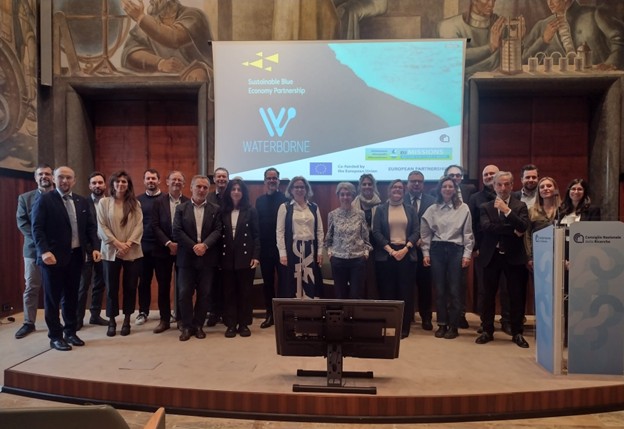- Home
- Blue Synergies In Action: Sustainable Blue Economy and Waterborne Launch Joint Dialogue
Blue Synergies in Action: Sustainable Blue Economy and Waterborne Launch Joint Dialogue
On 8 April 2025, the Sustainable Blue Economy Partnership, jointly with the Waterborne Technology Platform coordinating the Zero-Emission Waterborne Transport partnership and in collaboration with the EU Mission "Restore our Oceans and Waters", brought together leading experts, EU projects, and stakeholders from across Europe for a technical workshop on ports, marinas, logistics, and sustainable fisheries.
The event aimed to promote alignment between initiatives and explore potential joint actions by leveraging both portfolios of activities, identify key areas for thematic cooperation with actionable recommendations for impactful synergies, and discuss strategies to fine-tune development plans, enhance critical mass, and avoid duplications.
The workshop was structured around two core sessions:
- Ports, marinas and logistics, covering infrastructure decarbonisation, digitalisation, spatial planning and pollution reduction;
- Sustainable fisheries, focusing on vessel decarbonisation, application of Artificial Intelligence in fisheries management, and ecosystem-based governance.
Participants heard from a diverse line-up of speakers, including European Commission representatives, Waterborne TP and the two partnerships' project coordinators, technology developers, port authorities, and researchers.
During the first session, the meeting covered key topics such as the importance of training personnel for evolving port operations, managing costs for small and medium ports, and leveraging technology—including digital twins and digital solutions—for efficiency and sustainability. The establishment of a harbour emission service platform was discussed, aimed at monitoring shipping emissions. The importance of data collaboration among global terminal operators was emphasised, alongside the need for effective maritime spatial planning (MSP) to manage maritime spaces sustainably.
In the second session, discussions covered decarbonisation strategies (e.g. decarbonise the Mediterranean and Black Sea fishing fleet by improving gear and analysing socio-economic impacts) through balancing fuel efficiency with economic viability, showcased projects focus on the application of AI in sustainable fisheries management, and the application of Ecosystem-Based Fisheries Management. David Abril Molins, speaking on behalf of the Waterborne TP and Zero-Emission Waterborne Transport, highlighted the importance of cross-sector coordination:
“Decarbonisation in waterborne transport doesn’t happen in isolation. It requires coordinated action across ports, fisheries, shipping and local communities. This workshop marks the beginning of a continuous dialogue — and a shared commitment to building an integrated, sustainable Blue Economy to build a new relationship with our oceans.”
Margherita Cappelletto, speaking on behalf of the Sustainable Blue Economy Partnership, emphasised the added value of the collaboration across European initiatives:
“Marine Spatial Planning is an essential tool for integrated decision-making, particularly in the sustainable management of ports and maritime transport—a key area where a collaboration between partnerships can add value towards promoting innovative solutions. The workshop today was a starting point to enhance respective strategies and a building block of a stable way of jointly developing activities, towards increasing impact."
The event concluded with a forward-looking discussion on how the Waterborne TP, through Zero-Emission Waterborne Transport, and the Sustainable Blue Economy Partnership can continue aligning their strategies and identifying future opportunities for joint actions (e.g. synchronised calls), including with the forthcoming European Ocean Pact and the emerging Marine Knowledge and Innovation Community (KIC).
The event recording and report are now available online.


